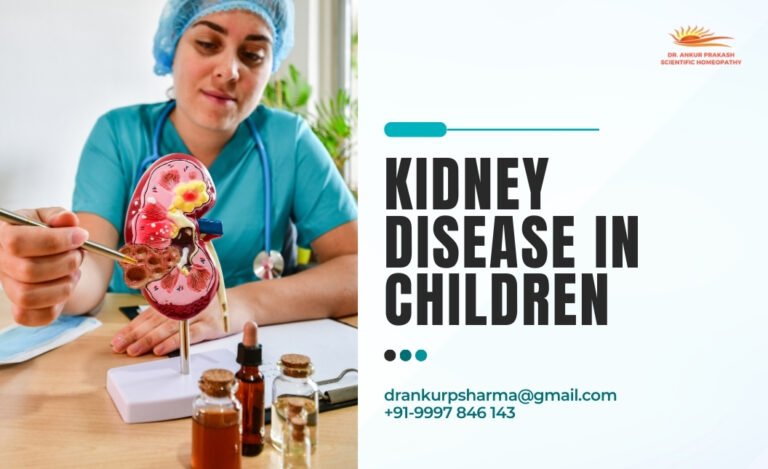- +91 9997 846 143
- drankurpsharma@gmail.com
- Mon - Fri: 9:00 - 18:30

Childhood kidney diseases encompass a range of kidney-related disorders that affect children. These diseases can vary greatly in their nature and severity. They may be congenital, meaning the child is born with the condition, or they can develop during childhood due to various factors such as infections, systemic diseases, or genetic predispositions. The impact of these diseases on a child’s health can range from mild and manageable conditions to serious, chronic illnesses requiring ongoing medical attention. The focus of these conditions is on the kidneys, the vital organs responsible for filtering waste products from the blood and regulating fluid and electrolyte balance in the body.
Kidney disease in children can arise from a variety of causes, each contributing to the development and progression of the condition. Understanding these factors is crucial for early detection and management.
Genetic Factors: Many kidney diseases in children are hereditary, caused by genetic mutations. Polycystic kidney disease and Alport syndrome are examples where genetics play a significant role. These inherited disorders can affect kidney structure and function from a young age.
Congenital Abnormalities: Some children are born with structural abnormalities in their kidneys or urinary tract. Conditions like horseshoe kidney or duplicated ureters can impede normal kidney function, leading to disease.
Infections: Certain infections, particularly urinary tract infections (UTIs), can lead to kidney disease if they’re recurrent or not adequately treated. Post-streptococcal glomerulonephritis is another infection-related condition that can affect the kidneys.
Systemic Diseases: Diseases that affect the whole body, like diabetes and lupus, can also damage the kidneys. These conditions can cause chronic inflammation and stress on the kidneys, leading to disease over time.
Blockages and Reflux: Obstructions in the urinary tract, or a condition called vesicoureteral reflux (where urine flows back into the kidneys), can cause repeated kidney infections and scarring, leading to kidney damage.
Nephrotic Syndrome and Glomerulonephritis: These are groups of disorders that affect the glomeruli, the tiny filtering units inside the kidneys. They can be caused by immune system disorders, infections, or other unknown factors.
Medication and Toxin Exposure: Certain medications and toxins can be harmful to the kidneys. Prolonged use of medications like NSAIDs or exposure to environmental toxins can lead to kidney damage.
Kidney disease in children can manifest through various symptoms, each indicating potential issues with kidney function. Recognizing these signs is vital for prompt diagnosis and treatment.
Swelling or Edema: One of the most common signs is swelling, particularly around the eyes, feet, and ankles. This occurs due to the kidneys’ inability to regulate fluid balance.
Changes in Urination: Children may experience changes such as increased frequency, discomfort, or difficulty in urination. The urine might appear foamy or bloody, indicating abnormal kidney function.
Fatigue and Weakness: Due to the buildup of waste products in the blood, children might feel unusually tired or weak, showing a lack of energy even for routine activities.
Appetite Loss and Weight Gain: A decrease in appetite, often accompanied by unexplained weight gain, can be a sign of fluid retention and poor kidney function.
High Blood Pressure: Kidney issues can lead to elevated blood pressure, even in children. This is a less obvious symptom but can be detected during routine check-ups.
Anemia and Pale Skin: The kidneys play a role in producing erythropoietin, a hormone that stimulates red blood cell production. Impaired kidney function can lead to anemia, causing paleness and additional fatigue.
Nausea and Vomiting: As toxins build up in the bloodstream, it can lead to nausea or vomiting, which is often more pronounced in the morning.
Difficulty Concentrating: Accumulation of toxins can also affect brain function, leading to issues with concentration and alertness.
Diagnosing kidney diseases in children involves a thorough evaluation by healthcare professionals, including medical history, physical examination, and various tests. These tests help determine the extent of kidney damage. Homeopathy offers an alternative treatment approach for kidney diseases in children. Homeopathic remedies are derived from natural substances and aim to stimulate the body’s self-healing mechanisms. Homeopathic practitioners consider the child’s symptoms and overall health to prescribe personalized treatments. While conventional medical diagnosis and treatment remain crucial, some parents explore homeopathy as a complementary option to support their child’s overall well-being. It’s essential to consult with healthcare experts to ensure a comprehensive approach to managing kidney diseases in children, combining conventional and alternative therapies when appropriate.
For expert care and personalized treatment plans from a renowned Kidney Specialist Doctor in Agra, trust the experience and expertise of Dr. Ankur Prakash. Book your appointment today for a healthier tomorrow.